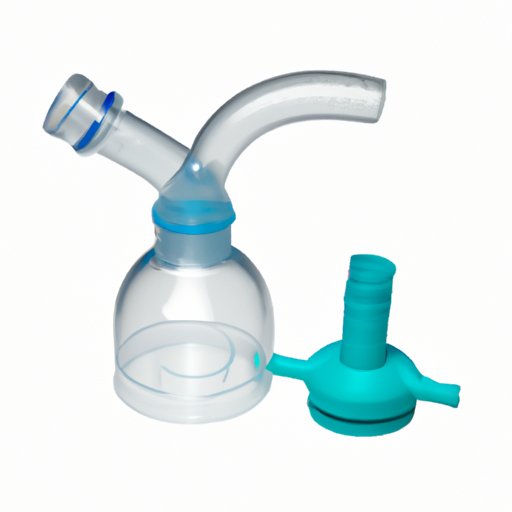
I. Introduction
If you have respiratory issues such as asthma or COPD, a nebulizer can be a useful tool to help manage your symptoms. A nebulizer is a device that administers medication in the form of a mist, making it easier to inhale and reach the lungs. In this article, we will detail how to properly set up, use, and care for a nebulizer, as well as provide information on the different types and benefits of using a nebulizer.
II. A Step-by-Step Guide
A nebulizer consists of several parts, including a compressor, a nebulizer cup, mouthpiece or mask, and tubing. To set up your nebulizer, first wash your hands and assemble the device according to the manufacturer’s instructions. You will then need to measure and mix your medication with saline solution in the nebulizer cup. Attach the tubing to the compressor and nebulizer cup, and connect the mouthpiece or mask. Turn on the compressor and breathe in the mist until the medication is gone. Rinse the nebulizer cup, mouthpiece or mask, and tubing with warm water, and allow to air dry before storing.
III. Frequently Asked Questions
When using a nebulizer, it is common to have questions or concerns. It is recommended to consult with your healthcare provider for specific instructions. Here are some frequently asked questions and tips:
1. How often should I use my nebulizer? Your healthcare provider will determine how often and for how long you should use your nebulizer. It is important to follow their instructions.
2. How do I properly measure and mix my medication? Use a medication cup or syringe to measure the medication and saline solution, as directed by your healthcare provider. Gently swirl to mix the solution before adding to the nebulizer cup.
3. How should I store my nebulizer medication? Store in a cool, dry place away from sunlight.
IV. Types of Nebulizers
There are several types of nebulizers available, including jet nebulizers, ultrasonic nebulizers, and vibrating mesh nebulizers. Jet nebulizers are the most commonly used and are effective for most medications. Ultrasonic nebulizers use high-frequency vibrations to create a mist and may be more convenient due to their smaller size. Vibrating mesh nebulizers use a mesh to create the mist and are effective for smaller doses of medication. Your healthcare provider can recommend which type of nebulizer is best for your needs.
V. Safety Tips
It is important to follow proper safety measures when using a nebulizer. Here are a few tips to keep in mind:
– Keep the nebulizer clean and disinfected. Wash the nebulizer cup, mouthpiece or mask, and tubing after each use.
– Check medication expiration dates before using.
– Dispose of used medication as directed by your healthcare provider.
– Store the nebulizer out of reach of children.
– Be aware of potential side effects, such as a fast heartbeat, dizziness, or shaking. Contact your healthcare provider if you experience any side effects.
VI. Troubleshooting
If you experience problems with your nebulizer, there are a few troubleshooting steps you can take. Be sure to consult with your healthcare provider if you continue to experience issues:
– Check that the device is properly assembled.
– Check that the medication cup is filled correctly and is not clogged.
– Check that the tubing is not twisted or kinked.
VII. Benefits of Using a Nebulizer
Using a nebulizer can provide several benefits for those with respiratory issues. By delivering medication directly to the lungs, a nebulizer can improve respiratory function and help manage asthma symptoms. Additionally, a nebulizer may be more effective than other types of respiratory medications, such as inhalers, for certain individuals.
VIII. Conclusion
Overall, a nebulizer is an effective tool for managing respiratory issues such as asthma or COPD. By following proper instructions and safety measures, individuals can use a nebulizer safely and effectively. If you have any additional questions or concerns, be sure to consult with your healthcare provider or pharmacist.





